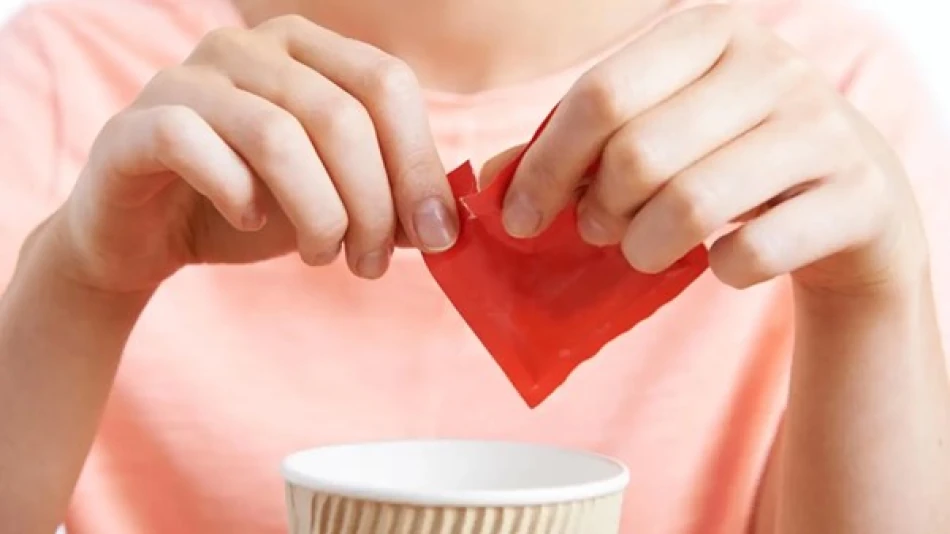
Artificial Sweeteners Undermine Cancer Treatment Effectiveness, Study Reveals
Artificial Sweetener Sucralose May Undermine Cancer Immunotherapy Success
New research reveals that cancer patients consuming high amounts of sucralose—a popular artificial sweetener found in diet sodas and sugar-free products—may experience significantly reduced effectiveness from immunotherapy treatments. The study suggests this common food additive disrupts gut bacteria in ways that weaken the immune system's ability to fight melanoma and non-small cell lung cancer.
The Hidden Connection Between Diet Choices and Cancer Treatment
A study published in Cancer Discovery examined 132 patients with advanced melanoma or non-small cell lung cancer, tracking their dietary habits through detailed questionnaires. Researchers found a clear correlation: patients with higher sucralose consumption showed diminished responses to immunotherapy treatments, directly impacting their survival prospects.
This finding challenges the widespread assumption that artificial sweeteners are merely neutral sugar substitutes. For cancer patients already facing difficult treatment decisions, the research suggests that seemingly innocuous dietary choices may be inadvertently sabotaging their therapy outcomes.
How Sucralose Sabotages the Immune System
The Gut Microbiome Connection
Laboratory experiments on mice revealed the biological mechanism behind this interference. Sucralose fundamentally alters the composition of gut bacteria, increasing microorganisms that break down arginine—an amino acid essential for T-cell function. T-cells serve as the immune system's primary defense force, particularly crucial for immunotherapy success.
Lead researcher Abby Overacre from the University of Pittsburgh explained that this arginine depletion prevents T-cells from performing their immune functions normally. The result: immunotherapy treatments become significantly less effective in sucralose-consuming subjects compared to control groups.
A Potential Solution Emerges
The research team discovered that arginine supplements could counteract sucralose's negative effects on immunotherapy in mice. This finding offers hope for a practical intervention that doesn't require patients to completely overhaul their diets during an already challenging treatment period.
Implications for Cancer Care and Patient Management
The study highlights a critical gap in cancer care coordination. While oncologists focus intensively on treatment protocols, the role of common dietary additives in therapy outcomes has received little attention. This research suggests that comprehensive cancer care should include nutritional counseling specifically addressing artificial sweetener consumption.
Overacre emphasized the practical challenges cancer patients face: "It's easy to stop drinking sugar-free sodas, but when patients are receiving cancer treatment, they're already dealing with enough. Asking them to radically change their diet may not be realistic." This acknowledgment points toward supplement-based solutions rather than restrictive dietary changes.
Broader Context: The Artificial Sweetener Controversy Deepens
This research adds to growing concerns about artificial sweeteners that extend beyond traditional worries about metabolic effects. Previous studies have linked various artificial sweeteners to altered glucose metabolism and gut microbiome disruption, but this is among the first to demonstrate direct interference with cancer treatment efficacy.
The timing is particularly significant as immunotherapy has revolutionized cancer treatment over the past decade, offering hope for previously untreatable cases. Any factor that diminishes these breakthrough treatments' effectiveness represents a serious clinical concern requiring immediate attention.
Next Steps: From Laboratory to Clinical Practice
The research team now plans to test arginine supplementation in human cancer patients, potentially offering a simple intervention to preserve immunotherapy effectiveness. If successful, this could lead to routine arginine supplementation protocols for cancer patients undergoing immunotherapy, particularly those with high artificial sweetener consumption.
The study also raises questions about whether similar effects occur with other artificial sweeteners or in different cancer types. As immunotherapy expands to treat various cancers, understanding all factors that influence treatment success becomes increasingly critical for optimizing patient outcomes.
Most Viewed News

 Layla Al Mansoori
Layla Al Mansoori






